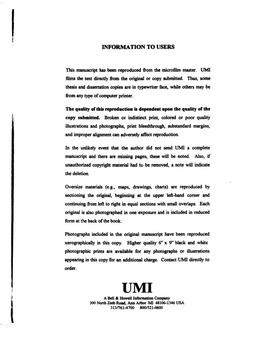| dc.contributor.advisor | Cadzow, Hunter, | en_US |
| dc.contributor.author | Kim, Kyong-hahn. | en_US |
| dc.date.accessioned | 2013-08-16T12:29:56Z | |
| dc.date.available | 2013-08-16T12:29:56Z | |
| dc.date.issued | 1997 | en_US |
| dc.identifier.uri | https://hdl.handle.net/11244/5582 | |
| dc.description.abstract | Chapter Two addresses Sir Thomas More as a Catholic humanist, who represents English humanism before the Henrician Reformation and nationalism. Henry's break with Rome gave momentum to the development of Tudor dynastic nationalism largely centered around the monarch. It played a key role in transforming the cause of Catholic humanism in the interest of the nation. | en_US |
| dc.description.abstract | Chapter Four defines Edmund Spenser as a Protestant humanist, whose nationalist cause is responsible for the Protestant cooptation of humanism in his work. In the age when the universal Church broke down and when the role of secular rulers became more and more central to national affairs, humanist participation in national government was indispensable to create the mystique of monarchy and thus the unity of the nation. These humanists, who each fell under particular political, theological, and cultural regimes, reveal disparate strategies of Christian humanism. | en_US |
| dc.description.abstract | Chapter Three sets up Sir Thomas Elyot as a transitional figure in terms of English humanism, caught in the religious and political drive of Henrician nationalism. He is basically Catholic but desires to take a vital role in nation-making. Elyot demonstrates the Morean Catholic humanism in transition. | en_US |
| dc.description.abstract | As the conclusion of the study, the epilogue offers a summary assessment of the previous chapters and suggests the possibility of further reconsideration of Christian humanists in the seventeenth century like Donne and Milton. | en_US |
| dc.description.abstract | As a way of approaching the term, Chapter One tracks down its origin in the twentieth century and resituates its ideological freight in the English Renaissance by reviewing some of its important ideas. Christian humanism turns out to be an ideology in our time to identify Christianity in humanism, divinity or spirituality in man. The notion of human divinity evolves into a theory of human dignity, human cooperation with divine grace in salvation, and even political radicalism when applied to the Renaissance humanist. At the same time, the enterprise to subsume Renaissance humanism under the umbrella term "Christian" fails to identify the peculiar historical situations of the period. It erases the very real difference between various forms of cultural representation of Christianity in the Renaissance. Christianity had undergone a long journey of transformation in the English Renaissance, from the old Catholicism, to the Henrician Reformation, to the Elizabethan Protestantism, and to the Puritan Revolution. To avoid the ahistorical sense associated with the term and to specify each individual condition in the evolution of Christian humanism, I propose a differentiation between both the humanist and theological nature of Christian humanism in each distinct period. | en_US |
| dc.description.abstract | I expect this dissertation to make a case for the necessity of historicizing the term "Christian humanism" to accurately appreciate the achievements of Tudor humanists--More, Elyot, and Spenser. | en_US |
| dc.format.extent | vii, 194 leaves : | en_US |
| dc.subject | Humanism, Religious. | en_US |
| dc.subject | Theology. | en_US |
| dc.subject | Elyot, Thomas, Sir, 1490?-1546. | en_US |
| dc.subject | More, Thomas, Saint, 1478-1535 | en_US |
| dc.subject | Literature, English. | en_US |
| dc.subject | Spenser, Edmund, 1552?-1599. | en_US |
| dc.subject | History, European. | en_US |
| dc.title | A reconsideration of "Christian humanism" in the English Renaissance: Historicizing More, Elyot, and Spenser with a focus on Tudor nationalism. | en_US |
| dc.type | Thesis | en_US |
| dc.thesis.degree | Ph.D. | en_US |
| dc.thesis.degreeDiscipline | Department of English | en_US |
| dc.note | Source: Dissertation Abstracts International, Volume: 58-12, Section: A, page: 4666. | en_US |
| dc.note | Adviser: Hunter Cadzow. | en_US |
| ou.identifier | (UMI)AAI9817714 | en_US |
| ou.group | College of Arts and Sciences::Department of English | |
